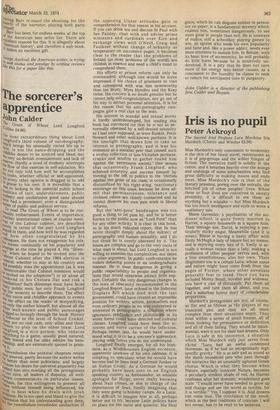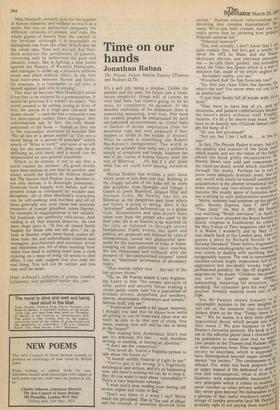Iris is no pupil
Peter Ackroyd
The Sacred And Profane Love Machine Iris Murdoch (Chatto and Windus £2.50) Miss Murdoch's only concession to modernity is the title of her latest novel, reminiscent as It is of pop-groups and the wilder fringes of fiction. The narrative itself is solidly in the centre, and it breathes heavily over the doings and undoings of some suburbanites who find great difficulty in making means and ends meet. Miss Murdoch's role is that of the literary priestess, poring over the entrails, the botched job of other peoples' lives. When three or four lives are conceived in sweaty proximity, it is difficult to see them as anything but a mistake — but Miss Murdoch has too much intelligence and style to write a cautionary tale.
Blaise Gavender, a psychiatrist of the soidisant school, is quite firmly married to Harriet, a square housewife in a square hole. Their teenage son, David, is enjoying a particularly sticky angst. Meanwhile (and it is mean), Blaise is having a nasty affair with Emily McHugh,a lady of leisure but no means, and is enjoying every bite of it. Emily is actually a woman rather than a lady, making a profession of other peoples' nerves and, with a fine unselfishness, also her own. Their illegitimate son is a certain Luca, whose name and nature might have come fresh from the pages of Forster, where other novelists generally fear to tread. Once you have included Monty Small, novelist and widower, you have a cast of thousands. Put them all together, and turn them all about, and you find a suburban horror story of considerable proportions. Murdoch's protagonists are not, of course, as flat and as lifeless as the players of my truncated plot and they are all more complex than their situations imply. They exist within a series of small frames,. all of them looking for permanence or definition and all of them failing. They would be insubstantial, were it not for their bad dreams. Only Luca is safe in his innocence, a situation which Miss Murdoch only just saves from cliche: "Luca had an awful condensed thereness, as if he had an exceptionally high specific gravity." He is as safe and as sound as the dumb household pets who pant through the narrative like an unusually agitated Greek chorus. Which is what they become when Nature, especially innocent Nature, becomes a peculiarly strident shade of red. As Harriet confesses after her domestic wonderland goes stale: "I would never have needed to grow up and change and see the world as terrible, for it is terrible." Yes, I suppose it is. And dreams can come true. The conclusion of the novel, which in the best traditions of criticism I will not reveal, has to be read to be believed.
Miss Murdoch certainly goes for the jugular in human relations, and without so much as a smile. She has an instinctive sympathy for different versions of unease, and runs the whole gamut of fiascos from the 'sacred' to the 'profane' although it is impossible to distinguish one from the other. Which may be the whole idea. Time will not tell. For Murdoch analyses the peripheries of passion, conveying only by indirection the pure and absolute centre. She is fighting a lone battle against the History of Western Philosophy, and manages to strike up a situation without cause and often without effect. In the first fatal interviews between Harriet and Emily, for example, it is impossible to tell who is sinned against and who is sinning.
This may be because Miss Murdoch's prose it too fine to be violated by a generalisation. It would be precious if it weren't so exact: "His world seemed to be sailing, sailing in front of him, the pieces of it huge and coloured like storm clouds" — and she has a romantic's ear for description rather than dialogue. Her conversations are, in fact, the only disappointment of the book — limited as they are to the statuesque utterance of maxims like "We all live in a dream world" or "I'm not a moral being or a person of principle" which smack of "What is truth?" and none of us will stay for the answers. Cold print can be as deflating as cold steel, and a novel can be shipwrecked on one general statement. Which, to be serious, is not to say that a novel cannot be 'serious: All great novels have been serious at one time or another, and where would the laurels be without heads?
But The Sacred And Profane Love Machine is not only serious, it is downright pessimistic.
Everyone lived happily ever before, and the present tense is consumed by muddle and deception. All of Miss Murdoch's characters can be self-seeking and horrible and all of them generally are; even those few precious 'moments of human grandeur, when Harriet, for example, is rnagnamimous to her unfaithful husband, are perfectly ridiculous. And ending is all that anyone deserves. As one poor dupe puts it, "It has all ended fairly happily for those who are left alive." Or, as Lear or Hamlet might have heard, noises off. How stale, flat and unfprofitable children and teenagers, psychiatrists and novelists, wives and mistresses are. All of them wanting 'love' when love itself is nothing more than a cock crowing on a heap of dung. Or words to that effect. I can only suggest that you read the real thing. You will not be sorrier and you may well be wiser.
Peter Ackroyd's collection of poems, London Lickpenny, was published earlier this year.



































 Previous page
Previous page